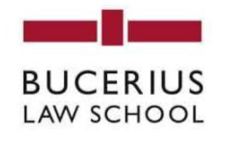
Bucerius Law School

Creating Service Levels to Match an Exceptionally High-Quality Education
As a prestigious, top-ranked law school, Bucerius’ students expect not only an excellent education, but also an exceptional level of service. Bucerius was challenged with meeting these demands. Its dated, stand-alone and decentralised IT systems limited the ability of departments to break the bounds of their silos and work collaboratively.
“In Germany, we’re top ranked, so our students expect not only a very good education, but also equally good service. We had an imbalance between these two that needed to be rebalanced,” said Peter Theunert, Head of Process Digitization, Bucerius Law School.
The team at Bucerius worked to identify those departments where the opportunity for change was great and the probability for meaningful, quick success was high.
They prioritised four key areas:
- Donors and corporate partners – Given that more than 16% of Bucerius’ €20 million budget is derived from donors, these relationships are critical. However keeping up-to-date on each donor and corporate partner—contribution history, contract expiration dates, students hired, etc was nearly impossible.
- International career services – Placing non-Europeans in the European legal market is especially difficult. It requires a non-standard process to specifically match the student’s skills to the needs of the employer. The team was using social media websites and spreadsheets in an attempt to manage this complicated, manually intensive process.
- The application portal for the three Bucerius summer programmes, and later for the Master’s programmes – Internally, the application process was much too labour intensive and the user experience was poor. Student data requests were duplicative and on the back end, data was being manually entered into a spreadsheet, leading to inaccuracies, misspellings, and overall team frustration.
- Alumni relations – Bucerius’ goal is to continue to play a key role in the life of its alumni. To do so, it needed to maintain contact and pertinent alumni information as well as engage them with relevant, interesting information.
“We were wasting lots of time, increasing frustration on all sides with poor student and employee experiences,” stated Theunert. “The increase in the number of students at Bucerius is increasing the amount of manual work, which is continuing to demotivate our employees.”
From Disparate, Siloed Systems to One Integrated Connected Campus
Bucerius selected Salesforce Education Cloud, and EDA as the foundation for building its connected campus. Using Sales Cloud & Community Cloud, the Law school has now implemented:
- A centralised database to manage all donor, corporate partner, and international student data.
- Streamlined donations processes. Today Salesforce allows the school to generate automated receipts for tax purposes and to receive early notifications for necessary negotiations before the contract ends.
- A modernised online application process that streamlined the collection of student application data, simplified the internal team’s data access, and facilitated communication between the internal team members and applicants.
- Mobile access for easy visibility and access to data.
- Executive level dashboards for real-time access to statistics and data.
Modernising Processes Enhances the Student, Employee, and Stakeholder Relationships
After only four months, Bucerius had realised the benefits of the new solution.
“Salesforce has helped us to build community amongst this group in a way that we couldn’t before. “With Salesforce, we have complete visibility into the operations of our school, we’ve experienced an 70% time savings, and have finally overcome the silo structure problem that was hindering our success. Furthermore, Salesforce has enabled us to create new, substantial synergies between our departments.”
Specific departmental results of implementing Salesforce include:
Donors and corporate partners
- Simplified the donor experience by standardising the contracts and streamlining the process from donation through to the automatic generation of a receipt.
- Streamlined relationship management efforts as now all donor information is found with a click of a button. The team is no longer dependant on gathering information from three separate departments.
- Increased efficiency among the team with the functionality of mobile access.
International career services
- Increased effectiveness of job placement with the centrally managed and detailed student and employer profiles that could be searched to result in a positive match.
Bucerius summer programmes application process
- 67% decrease in employee time to process an applicant.
- Created a stronger student experience by offering one application system for all programs.
- Increased team efficiency by centrally collecting and managing all applicant information, data, forms, and communications.
Alumni relations
- Attained complete data on 95% of Master’s program alumni, the initial target group.
- Reduced the number of alumni databases from five down to one.
Executive reporting
- Increased service to the executive team by offering real-time access to critical statistics.
- Eliminated the need for an employee to manually generate monthly reports.
The Journey to a Fully Connected Campus: Take it step by step, and let it grow
This is just the beginning for Bucerius. Their implementation of Salesforce has achieved its goals. Not only are they realising short-term success, but now there is great demand from other parts of the school to be implementing and utilising Salesforce both broadening and deepening the use of Salesforce throughout the entire Law school.
About Bucerius Law School
Founded in 2000, Bucerius Law School, the first private law school in Germany, is consistently ranked as one of the best law schools in the country. Located in Hamburg, admission to the school is highly competitive with an acceptance rate of less than 20%. This small school offers 4 international programs, three summer programs, and a full-time master’s program to its approximately 700 students, 20% of whom are international students representing more than 35 countries, every year.